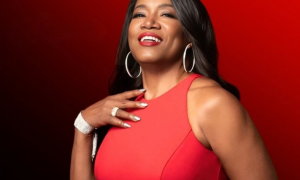In the Oscar-nominated film “Up in the Air," audiences watch the familiar routines of contemporary airline travel while hearing the unfamiliar sounds of an ancient Asian instrument, thanks to erhu virtuoso Karen Hua-Qi Han.
Like the violin, the erhu is a stringed instrument played with a bow, but many of the similarities end there.
“It's two strings, 'er' in Chinese means 'two,' “Han explained." 'Hu' means it's not really from China. It was from Tibet and Mongolia, that area, in the beginning. So they called it 'erhu.'"
Han started playing the erhu as a 6-year-old living in a small city near Shanghai. Her father was her first teacher.
“He plays erhu, so he taught me for probably half a year, and he noticed that he couldn't teach me anymore," she recalled. “So he told me that we had to find the best erhu teacher in town to teach me. Then after a year, that teacher said, 'I have to take you to the capital of the province, and you can go to that place to learn from the best teacher from there.'"
When Han was 10, she auditioned for the Central Conservatory of Music in Beijing and was one of two erhu players selected from thousands. She boarded at the school, and the government paid her expenses. By the time she graduated with bachelor's and master's degrees in performance arts, pop and rock music were all the rage in China.
“The door to the West had just opened," she said. “So I felt I lost what I learned. I practiced eight hours a day, and what was I going to do if people only listened to pop music?"
In 1988, Han moved to Los Angeles, where Americans not only appreciated erhu music, but they were also willing to pay her to play it. She began performing at events, and a music contractor approached her about lending her talents to the 1993 film “The Joy Luck Club." Since then, she's worked on such films as “Memoirs of a Geisha," “Kung Fu Panda," “2012" and “The Hurt Locker."
Like the violin, the erhu is a stringed instrument played with a bow, but many of the similarities end there.
“It's two strings, 'er' in Chinese means 'two,' “Han explained." 'Hu' means it's not really from China. It was from Tibet and Mongolia, that area, in the beginning. So they called it 'erhu.'"
Han started playing the erhu as a 6-year-old living in a small city near Shanghai. Her father was her first teacher.
“He plays erhu, so he taught me for probably half a year, and he noticed that he couldn't teach me anymore," she recalled. “So he told me that we had to find the best erhu teacher in town to teach me. Then after a year, that teacher said, 'I have to take you to the capital of the province, and you can go to that place to learn from the best teacher from there.'"
When Han was 10, she auditioned for the Central Conservatory of Music in Beijing and was one of two erhu players selected from thousands. She boarded at the school, and the government paid her expenses. By the time she graduated with bachelor's and master's degrees in performance arts, pop and rock music were all the rage in China.
“The door to the West had just opened," she said. “So I felt I lost what I learned. I practiced eight hours a day, and what was I going to do if people only listened to pop music?"
In 1988, Han moved to Los Angeles, where Americans not only appreciated erhu music, but they were also willing to pay her to play it. She began performing at events, and a music contractor approached her about lending her talents to the 1993 film “The Joy Luck Club." Since then, she's worked on such films as “Memoirs of a Geisha," “Kung Fu Panda," “2012" and “The Hurt Locker."


























